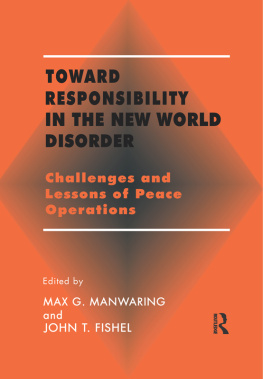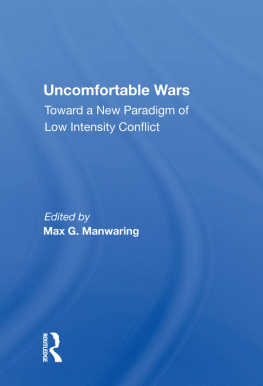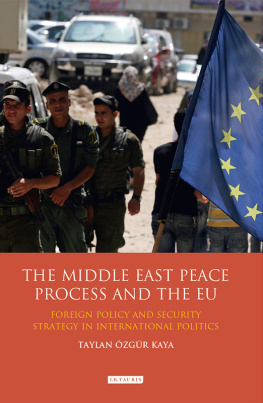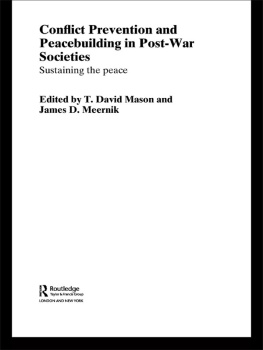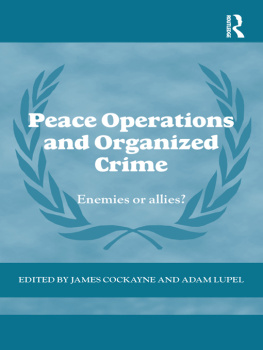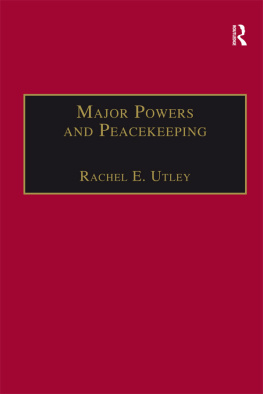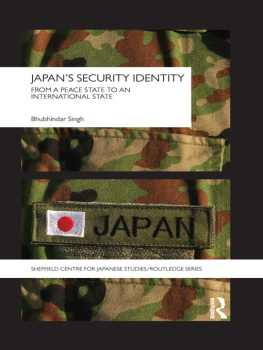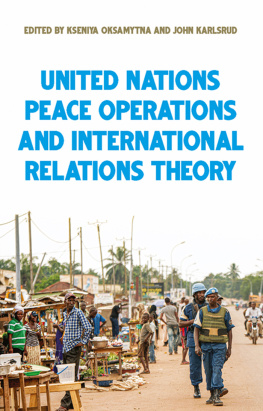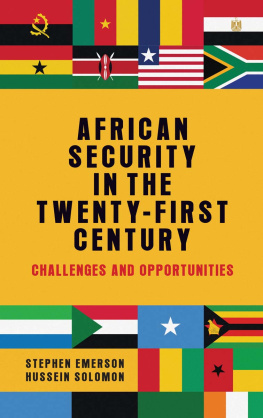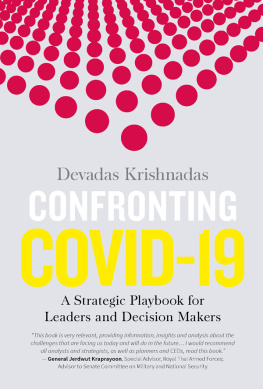TOWARD RESPONSIBILITY IN THE NEW WORLD DISORDER
Also in this series
Warriors in Peacetime:
The Military and Democracy in Latin America
edited by Gabriel Marcella
Defence and the Media in Time of Limited War
edited by Peter R. Young
First published 1998 by Frank Cass Publishers
Published 2013 by Routledge
2 Park Square, Milton Park, Abingdon, Oxon OX14 4RN
711 Third Avenue, New York, NY, 10017, USA
Routledge is an imprint of the Taylor & Francis Group, an informa business
Copyright 1998 Taylor & Francis
All rights reserved. No part of this book may be reprinted or reproduced or utilised in any form or by any electronic, mechanical, or other means, now known or hereafter invented, including photocopying and recording, or in any information storage or retrieval system, without permission in writing from the publishers.
British Library Cataloguing in Publication Data
Toward responsibility in the new world disorder:
challenges and lessons of peace operations. (Small wars and insurgencies)
1. Peace 2. Conflict management
I. Manwaring, Max G. II. Fishel, John T.
327.172
Library of Congress Cataloging in Publication Data has been applied for.
ISBN 13: 978-0-714-64901-6 (hbk)
ISBN 13: 978-0-714-64456-1 (pbk)
This group of studies first appeared in a Special Issue on Toward Responsibility in the New World Disorder: Challenges and Lessons of Peace Operations of Small Wars & Insurgencies (ISSN 0956-2318) 9/1 (Spring 1998) published by Frank Cass
Contents
| Editors |
| Max G. Manwaring |
| Michael Moodie |
| Kimbra L. Fishel |
| Donald E. Schulz |
| Walter S. Clarke |
| John T. Fishel |
| John Mackinlay |
| Michael J. Dziedzic |
| Robert H. Dorff |
| Dayton L. Maxwell |
| Max G. Manwaring and Edwin G. Corr |
The driving concept behind this special issue of Small Wars & Insurgencies is found in our title, Toward Responsibility in the New World Disorder. It has been our experience and perception that the major failing of the various civil-military peacekeeping operations beginning in the last days of the Cold War and continuing through the present has been the unwillingness of the major participants and the international community to accept fully their responsibility for the long-term outcomes of the interventions they undertake.
We lead off the volume with an extensive interview with retired US General John R. Galvin. He was Supreme Allied Commander in Europe culminating a distinguished military career which provided more than a passing acquaintance with recent peace and stability operations in the former Yugoslavia, the former Soviet Union, and Africa. His career also included tenure as Commander-in-Chief, US Southern Command and an intimate involvement in the conflicts in Central America during the 1980s. While at Southern Command, General Galvin published a seminal article entitled, Uncomfortable Wars. His extensive experience and that article provide continuity with our theme.
The second part of this special edition analyses four peacekeeping cases involving varying degrees of success and failure. Michael Moodie enters and leaves the Balkans with a cogent question as to whether traditional United Nations and NATO (North Atlantic Treaty Organization) peacekeeping approaches are sufficient to combat new challenges that could well become more familiar in future conflicts. Thus, he also wonders whether the conflict in the former Yugoslavia has been ended or merely interrupted. Kimbra Fishel looks at the Central American cases and stresses the fact that despite success in establishing peace in the region, the root causes of the conflicts there have yet to be addressed. The related question she asks is whether the current Central American peace is reality or illusion. This problem is repeated in Donald Schulzs analysis of the Haitian case. His concern is based on the fact that the intervening international community has been unwilling to make available the resources necessary seriously to address the central political and economic causes of conflict in and the refugee flow out of that unhappy place. Walter Clarke looks at the tragedies in central Africa over the past several years and the high probability of recurring complex humanitarian emergencies and state collapse in that part of the world. He argues that the implementation of a holistic and totally-integrated international civil-military campaign planning process is absolutely essential to help bring failed and failing states closer to peace and stability.
John Fishels contribution marks a transition to the next part of this special edition. Using as a point of departure, his recently published The Savage Wars of Peace, he discusses the normative implications of peacekeeping cases ranging from the Congo in the 1960s to Bosnia in the 1990s. Thus, his study sets the stage for John Mackinlays argument that current doctrine is inadequate to the requirements of contemporary multilateral and multi-organizational political-military peacekeeping. Michael Dziedzic focuses on identifying gaps in public security typically confronted during peace operations, and recommending measures intended to increase proficiency in providing that fundamental human right. Robin Dorff follows with a discussion of the ambiguous and subtle political nature of future peace operations. In turn, Dayton Maxwell challenges us all to address the difficult questions surrounding these kinds of collective security actions. Finally, Max Manwaring and Edwin Corr suggest that the lessons which should have been learned over the past several years of peacekeeping fall into a category that might best be described as almost obvious. That is, they are the kinds of lessons that had we kept our eyes open as we reviewed past peace operations and planned new ones, we might never have made the mistakes that these contributors illustrate.
Separately and collectively, those writing here argue that responsible peace operations take us beyond protecting a people from another group of people or from a government. They take us beyond compelling one or more parties to a conflict to cease human rights violations and other morally repugnant activities. They take us beyond repelling simple aggression. They take us beyond providing some form of humanitarian or refugee assistance in cases of misery and need. The amorphous contemporary peacekeeping task is to create internal conditions within failed or failing states that can lead to the mandated peace and stability with justice. The intent is to ensure that an internationally supported government does not revert to the unstable status quo ante and initiate another threat to the interdependent international community.
This volume, then, commends itself to the reader to provoke thought about what governments and international organizations ought to do when faced with the responsibilities of a given peace operation. Equally important, it suggests what we as citizens in the world community ought to demand of our governments and that community in the current world disorder. In that context, we commend this special edition of Small Wars & Insurgencies to you the reader with the hope that you will make effective use of the insights of the contributors.
MGM/JTF
MAX G. MANWARING
John R. Galvin served as Supreme Allied Commander, Europe (SACEUR); and as Commander-in-Chief of the US European Command (CINCEUR) from 1987 to 1992. Prior to that, he served for two years as Commander-in-Chief of the US Southern Command in Panama (CINCSOUTH). General Galvin has also served in several academic positions both during his more than 40 years in the Army and since. He is the author of many articles and several books, including

